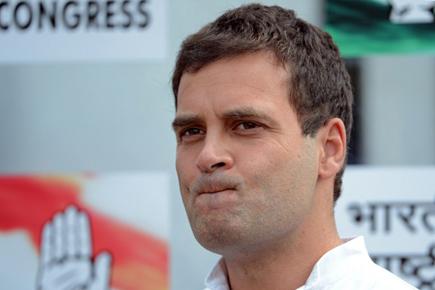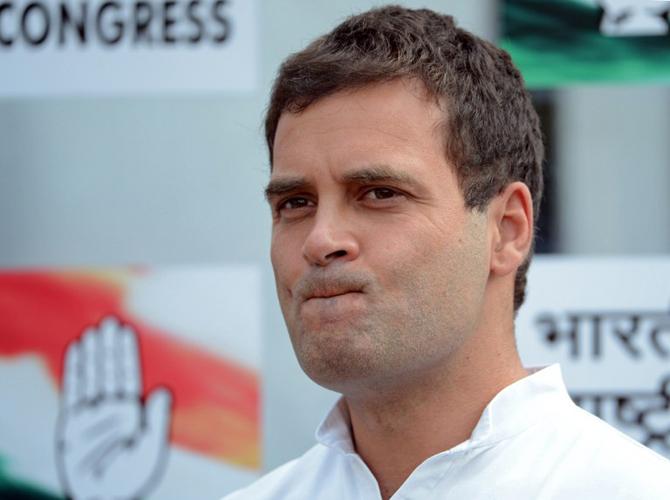Congress on Sunday demanded an explanation from the Prime Minister's Office on why the police were seeking details about its vice president Rahul Gandhi even as the BJP said it was a 'routine' security-related inquiry

New Delhi: The Congress on Sunday demanded an explanation from the Prime Minister's Office on why the police were seeking details about its vice president Rahul Gandhi even as the BJP accused the opposition party of making an issue out of a "routine" security-related inquiry. The Congress was also set to raise the issue in parliament on Monday.
ADVERTISEMENT
Terming the incident "Snoopgate 2", Congress MP Shashi Tharoor said the prime minister needed to explain why the government needed details of a person protected by the Special Protection Group (SPG). "PMOIndia needs to explain why it needs details of a person protected by the SPG. All his movements are recorded by SPG," he tweeted.

Rahul Gandhi. File pic
"Police sought telephone numbers, addresses of Rahul Gandhi's associates and friends. Delhi Police need to clarify why this info was needed," he said. Tharoor said: "Original Snoopgate involved misuse of Gujarat government machinery for surveillance of a woman. Snoopgate2 involves misuse of police versus opponents?"
Delhi Police personnel visited Rahul Gandhi's residence last week and also sought details about his height and colour of eyes and hair. Party spokesperson Anand Sharma said the party would raise the issue in parliament. Addressing reporters at the Congress headquarters in New Delhi, he said the Narendra Modi government "has much to answer when it comes to right of privacy of citizens".
"They are now trying to do it everywhere what was happening in one state. Both Modi and Amit Shah are now here. It is not confined to one person. It is much deeper. The practice that they had adopted in Gujarat, they want to carry it out now every where," he said.
Sharma, who has alleged in a newspaper interview that phones of senior leaders are being "tapped" and that they are under "surveillance", backed his statement, saying "letters are not sent for phone tapping to political leaders, judges and others ... It can be proved only if the prime minister, home minister give letters to opposition leaders regarding their phone tapping".
The Bharatiya Janata Party accused the Congress of trying to politicize the issues. In Hyderabad, union Parliamentary Affairs Minister M. Venkaiah Naidu said Prime Minister Modi or Home Minister Rajnath Singh were in no way involved in the police trying to find out details about Rahul Gandhi.
"According to Delhi Police, there was a security-related check and inquiry at the house of the Congress leader. Neither the prime minister nor home minister or government are in any way involved in this routine check and security drill by the security apparatus of Delhi Police," Naidu told reporters. He also claimed that the same thing happened to him when he was in the opposition.
"They came and gave a questionnaire and asked me to sign that also. When I became minister, there was some inquiry. They said it is a routine check and we have to do it because we are giving you Z-plus security. They asked who are frequent visitors; any suspicion about anybody who is roaming around your house; do you notice anybody who is not familiar," he said.
The minister said same questions were put to senior parliamentarian L.K. Advani, BJP president Amit Shah and even Prime Minister Modi earlier. "We should not make issues out of non-issues and create controversies simply because some questioning has been done," Naidu said. During Congress regime, there used to be surveillance on telephones and lots of such complaints were received, he alleged.
On Saturday, the Congress had condemned Delhi Police's "unnecessary and weird enquiries" about Rahul Gandhi and termed it "political espionage". "This kind of political espionage, snooping, surveillance and intrusion in political opponent's life may be Gujarat model but not Indian model," party spokesperson Abhishek Singhvi said, referring to Modi's oft-quoted Gujarat model of development.
 Subscribe today by clicking the link and stay updated with the latest news!" Click here!
Subscribe today by clicking the link and stay updated with the latest news!" Click here!






